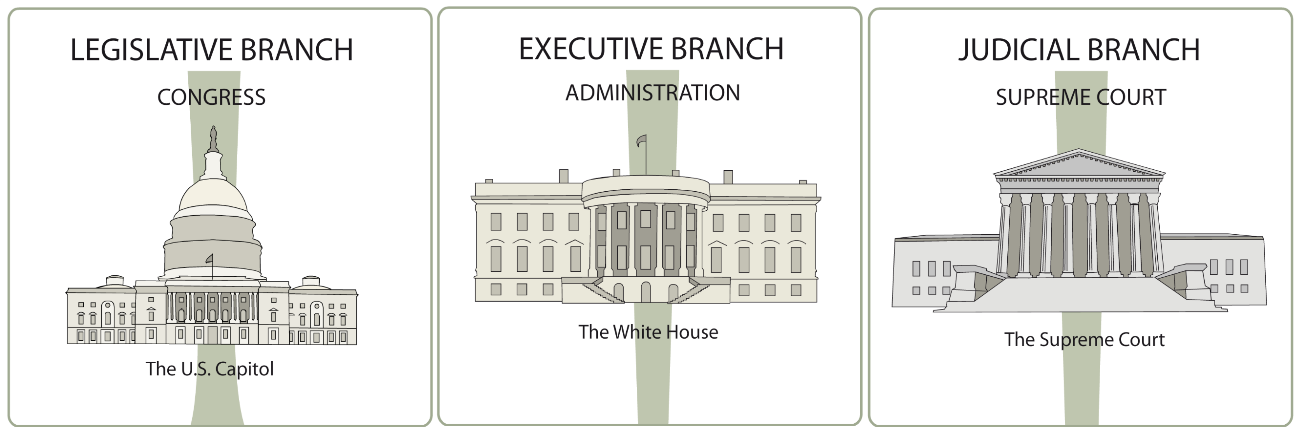The purpose of the three branches of government is to be checks on one another, but are becoming increasingly hyperpartisan and polarized. (Used by permission of the Norwegian Digital Learning Arena.)
Starting as early as elementary school, kids learn about how our government functions and operates.
From general Social Studies classes to the more advanced Civics and AP Government and Politics, learning the mechanics of the American political machine is something required for students to learn.
However, have the lessons we’ve learned from these classes created a generation of voters who don’t know how to elect a functioning government?
One of the first and most important subjects covered in any government class is checks and balances. The idea is that we split our government into three co-equal branches that have checks on one another so that one branch doesn’t gain too much power. Some examples include the President vetoing legislation from Congress, the Supreme Court having the power to rule acts by both the President as well as Congress unconstitutional, and Congress having the power of impeachment.
For about 250 years, this process has worked fine and has produced bills and acts that have sometimes helped the American people, but recently it seems as though checks and balances have been failing us.
In the most recent election, we saw both on the federal and state level, voters splitting their tickets to elect Democrats to the executive position and Republicans to the legislative positions.
On the federal level, we saw voters in Maine as well as Georgia vote for Biden as president, while also voting for their Republican senators. (I should note that since neither Senator candidate in Georgia reached a majority of the vote on November 3rd, a runoff will take place on January 5.)
In the House, several suburban and minority heavy districts voted for President-elect Biden while simultaneously electing Republican Representatives.
Now I know this just sounds like me whining about Democrats losing in key races, but that’s not the point I’m trying to make. After Democrats flipped the House of Representatives in 2018 we saw gridlock like never before. The House would pass something that the Republican controlled Senate wouldn’t even bother to take up. Just about the only thing the Senate took the time to vote on is judicial appointments.
My question to the American voters: after seeing nothing get done in the last two years, why would you vote for a split government? The obvious answer is they simply might not be well versed on the dealings in Washington, but my theory is that of the beginning of this article: Civics has taught us that checks and balances still function in this day and age.
“There is this sort of mysticism around bipartisanship and how checks and balances is supposed to work even though it often doesn’t today in the way it did in the past. Many of the so-called ‘swing voters’ in terms of moderates are among those voters who are the least informed. So, they vote based upon things like which name they like or which candidate’s ad they just saw and liked. They don’t really think about policy considerations and you end up with this,” said Jacob Smith, no relation to the author, an Assistant Research Professor in the Stats Department at Duke University in an email.
The way we teach checks and balances makes some voters believe that they can create a functioning government by splitting their tickets. They believe that having one party control the executive branch and a different party controlling Congress will prevent legislation that’s too far left or right from passing, but that’s not what happens.
The two branches won’t work together and will pass nothing. If a government doesn’t work to pass any laws then things stay stagnant. A stagnant government may seem fine — a stagnant government can still pass the same budget as last year and keep things working the same as they were. However, that is not a recipe for survival. A government that only does the bare minimum to keep things running instead of working to address and fixing the existing problems is not sustainable.
Yes, our taxes are still collected, but what about the members of our community who cannot afford to pay those taxes while the people they work for don’t pay their fair share. Yes, our roads may be drivable, but what about the ones who would be financially ruined if they happened to blow a tire on that highway. Yes, our schools may seem fine, but our teachers are not paid enough and the infrastructure in many of our lower income area schools are literally making our kids sick.
Let’s look closer to home. In North Carolina, voters re-elected Governor Cooper, a Democrat, by about 4.5 points, which is pretty big by NC standards. However, they split their tickets for Republican candidates in the State Senate and House, even while Cooper was most likely winning quite a few of those districts. In 2018, Democrats broke supermajorities in both chambers of the General Assembly, which meant overturning Governor Cooper’s vetoes would no longer be an easy task.
For the past two years, all we’ve seen is the Republican-controlled General Assembly pass right-leaning legislation, Governor Cooper vetoes, then the two sides fight for weeks trying to get the upper hand. You’d think after seeing this voters would vote in a Republican Governor or Democratic Assembly, but they kept things the same.
Gridlock does nothing to benefit an elected body’s constituents, and a functioning government cannot exist with only gridlock. A functioning government actually identifies new issues that arise and passes laws to remedy them, instead of leaving things as they are. To properly function, a government has to be proactive, but currently ours is just doing what’s loosely required while complications keep popping up and growing. Without progress, our already struggling populations will lag further behind and our at risk populations will begin their own freefall.
I feel as though in theory checks and balances keep things in the middle, in this day and age of hyperpartisanship, where we literally have members of a political party attempting to overturn the results of an election because their candidate didn’t win, it can’t work. The founders of our government never expected polarization to get this deep, but now that it has some of their ideas are no longer feasible. Whether or not voters don’t want anything to get done or maybe they just aren’t well informed enough, it’s clear that the next two years of politics are going to look similar to the last two, so don’t expect much to get done.

Hi! My name is Jacob Smith and I am a staff writer for The Mycenaean. I am also a political activist and volunteer.

Leave a Reply